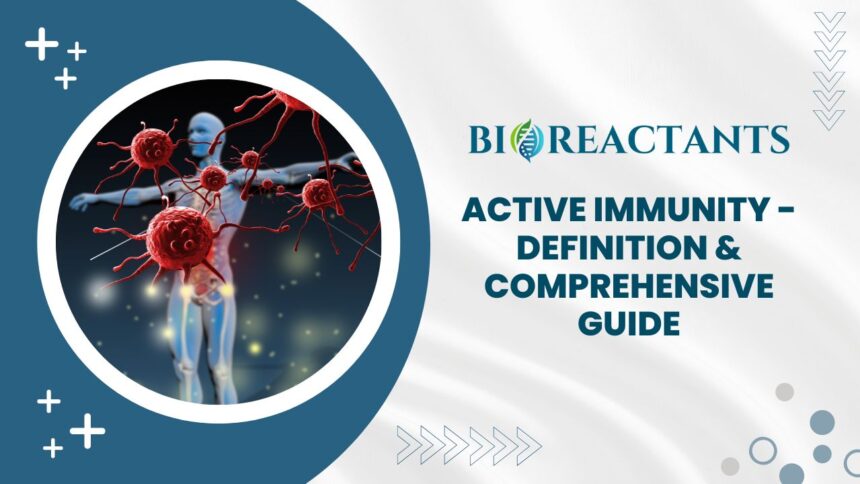Are you curious about how your body builds its defense system against harmful pathogens? Active immunity is like having a superhero squad within you, ready to fight off any invaders. In this blog post, we will dive into the fascinating world of active immunity, exploring how it develops, the role of memory cells, and much more. Get ready to uncover the secrets behind your body’s natural armor!
What is active immunity?
Active immunity is your body’s way of defending itself against pathogens, such as bacteria and viruses. It involves the activation of your immune system to produce antibodies that specifically target these invaders. Unlike passive immunity, which provides immediate but temporary protection through external antibodies, active immunity empowers your own immune cells to recognize and destroy threats.
When you encounter a pathogen for the first time, your immune system goes into action mode. It starts producing antibodies that latch onto the foreign molecules and mark them for destruction by other immune cells. This process primes your body to remember how to combat this specific threat in the future.
By developing active immunity, your body becomes more equipped to fend off infections efficiently. It’s like training an elite task force within your system that stands ready to defend you whenever needed.
How does active immunity develop?
Active immunity develops when the body’s immune system is exposed to an antigen, such as a virus or bacteria. When this happens, specialized cells called B lymphocytes are activated and produce antibodies specific to that particular antigen. These antibodies help in identifying and neutralizing the invader.
As the immune response progresses, memory B cells are generated. These memory cells remain in the body even after the initial infection is cleared, providing long-term protection against future encounters with the same pathogen. This process is crucial for establishing immunity and preventing re-infection.
Additionally, T lymphocytes play a significant role in active immunity by coordinating and regulating the immune response. They help in activating B cells to produce antibodies and also destroy infected cells directly.
Active immunity development is a complex but essential process that ensures our bodies can effectively defend against harmful pathogens over time.
What triggers the production of antibodies in active immunity?
When it comes to active immunity, understanding what triggers the production of antibodies is key. The process kicks off when a foreign substance, known as an antigen, enters the body. Antigens can be from viruses, bacteria, or other pathogens that invade our system.
Once the immune system detects these antigens as invaders, specialized cells called B lymphocytes are activated. These B cells then start producing antibodies to specifically target and bind with the antigens. The antibodies act like flags signaling to other immune cells to come and eliminate the threat.
The activation of helper T cells also plays a crucial role in triggering antibody production. These T cells help coordinate the immune response by releasing signals that support B cell activation and differentiation into plasma cells which produce more antibodies.
In essence, it’s a well-orchestrated dance within our immune system that ultimately leads to the effective production of antibodies against specific antigens.
What role do memory B and T cells play in active immunity?
When it comes to active immunity, memory B and T cells are the unsung heroes of our immune system. These specialized cells have a remarkable ability to “remember” specific pathogens that the body has encountered before.
Memory B cells are like little immune detectives, ready to spring into action at the first sign of a familiar intruder. They quickly produce antibodies tailored to target and neutralize the remembered pathogen.
On the other hand, memory T cells act as enforcers, patrolling the body for any signs of trouble. When they encounter a previously encountered antigen, they swiftly mount a targeted response to eliminate the threat.
Together, these memory cells form an essential part of our defense system against recurring infections. Their rapid response capabilities help ensure that we can fight off harmful invaders more effectively in the future.
What is the difference between active and passive immunity?
Active immunity and passive immunity are two distinct ways our bodies defend against pathogens. Active immunity is like your body’s own personal army – it’s the defense system you build up over time through exposure to antigens, whether from infections or vaccinations. It’s a proactive approach that prepares your immune system for future battles.
On the other hand, passive immunity is more like borrowing someone else’s army temporarily. This form of protection comes from outside sources such as antibodies passed from mother to baby during pregnancy or through certain medical treatments. While active immunity provides long-lasting protection due to memory cells being formed, passive immunity offers immediate but temporary defense.
So, in essence, active immunity is all about empowerment and self-sufficiency, while passive immunity relies on external assistance for a quick fix when needed. Both have their roles to play in keeping us healthy!
How long does active immunity last?
Active immunity can last for years or even a lifetime, depending on the individual and the specific pathogen. The immune system’s memory cells play a crucial role in maintaining long-lasting protection against future infections.
When exposed to a particular antigen, memory B and T cells are activated and ready to mount a rapid response upon re-exposure. This mechanism allows active immunity to persist for an extended period.
Factors such as age, overall health, and environmental influences can also impact the duration of active immunity. Regular exposure to pathogens or booster vaccinations may be necessary to reinforce immune responses over time.
Understanding how long active immunity lasts is essential for developing effective vaccination strategies and protecting individuals from infectious diseases in the long term.
Can vaccines provide active immunity?
Vaccines are potent tools designed to kickstart the body’s immune response, providing active immunity against specific diseases. By introducing a weakened or inactive form of a pathogen into the body, vaccines prompt the immune system to produce antibodies to fight off potential future infections.
These antibodies remain in your system, ready to recognize and combat the actual harmful virus or bacteria if encountered later on. This process not only protects you from falling ill but also helps prevent the spread of contagious diseases within communities.
Through vaccination, individuals can develop robust immunity without experiencing the full-blown illness associated with certain pathogens. Vaccines have played a crucial role in eradicating deadly diseases like smallpox and significantly reducing the prevalence of others such as measles and polio globally.
By harnessing our body’s natural defenses through vaccines, we can bolster our immune systems and build resilience against various infectious agents.
What are some examples of active immunity in humans?
Active immunity in humans can be naturally acquired through previous infections. When someone contracts a virus or bacteria and their immune system successfully fights it off, they develop active immunity against that specific pathogen. For example, if you had chickenpox as a child, your body developed active immunity to the varicella-zoster virus which causes chickenpox.
Vaccines are another common way to induce active immunity in humans. Vaccines contain weakened or inactive forms of pathogens that stimulate the immune system to produce antibodies without causing the actual disease. For instance, vaccines for diseases like measles, polio, and tetanus help the body develop long-lasting protection against these illnesses.
Examples of active immunity in humans showcase the remarkable ability of our immune system to remember past encounters with pathogens and mount effective defenses when faced with future threats.
How does active immunity protect against future infections?
When it comes to active immunity, the body’s defense mechanisms are primed and ready to ward off any future attacks. Think of it as having a highly trained army always on standby, waiting to combat any invading pathogens.
Once your immune system has encountered a specific pathogen and developed antibodies against it, those memory cells stick around for the long haul. They essentially remember the enemy and can mount a rapid response if that same invader tries to strike again.
This means that upon re-exposure to the same pathogen, your immune system can quickly recognize it and launch a targeted attack before you even feel sick. It’s like having an elite task force that knows exactly how to neutralize the threat efficiently.
Active immunity provides long-lasting protection by creating a robust immune memory bank that keeps you guarded against potential threats in the future. So, next time those pesky germs come knocking, your body is well-equipped to kick them out without breaking a sweat.
What happens during the primary immune response in active immunity?
During the primary immune response in active immunity, a series of intricate processes are set into motion within the body. It all begins when an antigen enters the system, triggering specialized cells to identify and engulf it. This prompts B cells to produce antibodies that specifically target the antigen for destruction.
As these antibodies circulate in the bloodstream, they bind to matching antigens, marking them for neutralization by other immune cells. T cells also play a crucial role during this phase by coordinating and regulating the immune response.
Over time, the number of specific antibodies increases, leading to a peak in immunity against that particular antigen. Once the threat is eliminated, some memory B and T cells remain ready to mount a rapid defense if encountered again in the future.
This initial reaction lays down the foundation for long-term protection against potential infections through active immunity’s robust defense mechanisms.
What is the significance of antigen recognition in active immunity?
Antigen recognition is like a secret code that the immune system uses to identify invaders. It’s like a fingerprint that helps our body distinguish between friend and foe. When an antigen is detected, it triggers a cascade of events within our immune cells, setting off a chain reaction to mount a defense.
This recognition process is crucial for launching an effective immune response. Without recognizing the specific antigens on pathogens, our immune system wouldn’t know where to direct its attack. Antigen recognition guides our antibodies and T cells to lock onto the invaders with precision, increasing the chances of eliminating them successfully.
By honing in on these unique markers, our immune system can tailor its response to combat different types of pathogens effectively. This targeted approach ensures that resources are allocated efficiently towards neutralizing threats while minimizing collateral damage.
In essence, antigen recognition acts as the key that unlocks the door to immunity – allowing our body to remember and respond swiftly upon encountering familiar foes in the future.
How can active immunity be enhanced or boosted?
When it comes to enhancing or boosting active immunity, there are several strategies that can be effective. One way is through booster shots, which help reinforce the immune response triggered by initial vaccinations. These additional doses of a vaccine can strengthen the body’s ability to fight off specific pathogens.
Another method is through a healthy lifestyle, including regular exercise, balanced nutrition, and adequate sleep. All these factors play a role in supporting overall immune function and can contribute to maintaining an optimal immune response.
Additionally, reducing stress levels can also have a positive impact on immunity. Chronic stress has been linked to weakened immune function, so finding ways to manage stress effectively is crucial in enhancing active immunity.
Furthermore, incorporating certain foods and supplements known for their immune-boosting properties such as vitamin C, zinc, and probiotics can also help fortify the body’s defenses against infections. By taking proactive steps to support the immune system, individuals can enhance their active immunity and better protect themselves against pathogens.
What are the challenges in achieving effective active immunity?
Achieving effective active immunity poses several challenges that need to be overcome. One of the main obstacles is ensuring that the immune response triggered by vaccination or infection leads to long-lasting protection against specific pathogens. This requires a delicate balance in stimulating the right type and amount of immune cells.
Another challenge lies in addressing individual variations in immune responses. Factors such as age, genetics, underlying health conditions, and previous exposures can influence how well someone responds to vaccines or infections.
Additionally, maintaining adequate levels of memory B and T cells over time is crucial for sustained protection. Strategies to enhance these memory cell populations are being explored to improve the longevity of active immunity.
Furthermore, developing vaccines that elicit strong and durable immune responses without causing adverse effects remains a complex task. Researchers continue to investigate novel vaccine technologies to address this challenge effectively.
Is active immunity always permanent?
Active immunity is a fascinating aspect of our immune system, but is it always permanent? The duration of active immunity varies depending on the individual and the specific pathogen. While some vaccines can provide long-lasting protection, others may require booster shots to maintain immunity over time.
Factors like age, overall health, and exposure to pathogens can also influence how long active immunity lasts. In some cases, the immune response may wane over time, leading to reduced protection against certain diseases.
The concept of “immune memory” comes into play here – memory B and T cells can help maintain active immunity by quickly recognizing and responding to familiar pathogens upon re-exposure. However, this doesn’t guarantee indefinite protection. Regular assessments of antibody levels and potential re-vaccination may be necessary in certain situations.
In essence, while active immunity can offer robust protection against infections, its permanence is not guaranteed for every individual or disease.
What role do memory cells play in maintaining active immunity?
Memory cells are the unsung heroes of our immune system. Once exposed to a specific pathogen, memory B and T cells remember it for future encounters. This memory allows for a quicker and more robust response upon re-infection.
Unlike naïve immune cells, memory cells don’t need as much stimulation to spring into action. They can rapidly multiply and differentiate into effector cells, effectively neutralizing the threat before it causes harm.
By maintaining a pool of these specialized memory cells, our body ensures long-lasting protection against previously encountered pathogens. This immunological “memory bank” is what makes vaccines so effective in preventing diseases – they train our immune system’s memory to recognize and combat specific invaders efficiently.
In essence, memory cells act as the frontline defense team on standby, ready to mobilize at a moment’s notice when familiar foes come knocking again.
Conclusion
Active immunity is a crucial aspect of our immune system that provides long-lasting protection against various pathogens. By understanding how active immunity develops, the role of memory cells, and the significance of antigen recognition, we can appreciate the complexity and effectiveness of our body’s defense mechanisms. While challenges exist in achieving optimal active immunity and it may not always be permanent, advancements in science such as vaccines continue to enhance our ability to boost and maintain this important defense mechanism. Active immunity plays a vital role in safeguarding our health and well-being by protecting us from future infections.




